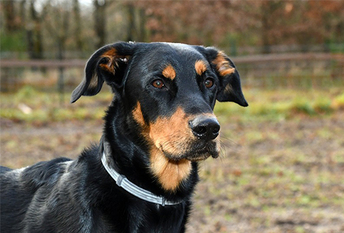The Weimaraner is a no-fuss breed when it comes to grooming. The coat is naturally dirt repellant and weekly brushing will keep the coat and skin healthy. They shed year round, but regular brushing keeps loose hair under control. Wiping the coat with a chamois will make it shine. Bathe as needed.
Check the ears on a weekly basis for signs of infection, irritation, or wax build up. This is especially important because Weimaraner's pendant ears don't allow for proper air circulation, making them especially prone to ear infections. Cleanse regularly with a veterinarian-approved cleanser and cotton ball.
Brush the teeth at least once per week to prevent tartar buildup and fight gum disease. Additionally, nails should be trimmed once per month if the dog does not wear the toenails down naturally.
With a lot of speed comes a high tolerance to exercise, so be sure to give your Weimaraner plenty of space to roam around in. This is another reason this particular breed is so well-suited for the country life.
They love a good run. While walking is OK, stretching their legs and getting “up to a full head of steam” is far better. A tired Weimaraner is a good Weimaraner.
A hunter by instinct, the Weimaraner likes a good piece of meat as much as any dog, but can also go for whole foods like vegetables.Owners should feed a highly rated food that has a moderately high protein content.
If feeding kibble, some people add water to dry food. If dry food is enhanced with canned food or table scraps, be careful not to add too much.
Kibble can be flavored with some fat or meat to entice these dogs, and keep in mind that it’s important to meet its appetite needs and not let it feel starved throughout the day.Rich food can upset their digestion.
The average life span of the Weimaraner is 10 to 13 years. Breed health concerns may includebloat (gastric dilatation and volvulus), elbow andhip dysplasia, hypertrophic osteodystrophy (HOD), tricuspid dysplasia, peritoneopericardial diaphragmatic hernia, pododermatitis, generalized demodicosis, neutrophil function defect of Weimaraners,meningitis, spinal dysraphism,entropion, distichiasis, eversion of the cartilage of the nictitating membrane, refractory corneal ulceration andvon Willebrand disease.
With a high propensity toward hunting activities, the Weimaraner can be strong and obedient. They should not necessarily be trained like Golden Retrievers – a hunting dog that’s friendlier toward strangers – but should be properly socialized so that they know the world doesn’t revolve around your piece of land or your family. Its loyalty can be tricky, so be sure to be relaxed and give your dog plenty of opportunities to socialize with other dogs as it grows up so that it can learn the proper methods of socialization.












